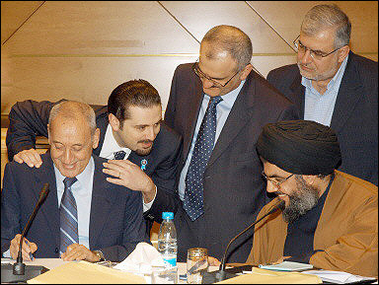B EIRUT, March 14 (Reuters) – Lebanese leaders agreed at national talks on Tuesday to disarm Palestinian factions outside refugee camps within six months and called for full diplomatic ties with Syria. But the officials meeting to end a political crisis that has paralysed the country did not agree on the two hottest issues: disarming the pro-Syrian Hizbollah guerrilla group and the fate of pro-Syrian president Emile Lahoud.
EIRUT, March 14 (Reuters) – Lebanese leaders agreed at national talks on Tuesday to disarm Palestinian factions outside refugee camps within six months and called for full diplomatic ties with Syria. But the officials meeting to end a political crisis that has paralysed the country did not agree on the two hottest issues: disarming the pro-Syrian Hizbollah guerrilla group and the fate of pro-Syrian president Emile Lahoud.
The talks came close to collapse last week when a row broke out over demands by an anti-Syrian leader visiting the United States for Hizbollah to be disarmed. But top politicians, pro- and anti-Syrian, Muslim and Christian, gathered again on Tuesday to thrash out some of the less complex issues. "All those gathered agreed to establish equal relations between the two countries based on mutual trust and respect to be embodied as soon as possible through the establishment of diplomatic ties between Syrian and Lebanon at the levels of embassies," Berri told reporters after the meeting. He said the leaders affirmed a government decision "to end the presence of the arms outside the refugee camps in six months and to tackle the issue of the arms inside the camps," but pledged to improve dismal Palestinian living conditions in Lebanon also. The politicians also agreed to consider the Israeli-occupied Shebaa Farms border area Lebanese land and to follow up the issue with the United Nations, which considers it Syrian soil seized by the Jewish state in the 1967 Middle East War.



